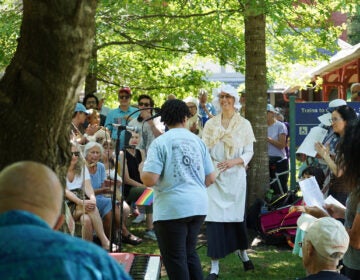New LGBTQ mentorship program available for Penn med students
Listen
Madeline Sherry (right) has mentored Delialah Burns for nearly 10 years through the Philadelphia Futures program. (Lindsay Lazarski/WHYY)
How do you find mentors if your identity doesn’t align with the majority of leading people in your field? A new LGBTQ mentorship program is helping med students at University of Pennsylvania break those barriers.
When Assistant Professor Judd Flesch was in med school a decade ago, he decided not to come out to his professors. He even lifted mention of membership in LGBTQ campus groups on his resume.
Fast forward to now, and he’s an openly gay mentor to an LGBTQ med student. Although the world has changed a lot in that last decade, Flesch said some professions are still catching up.
“Medicine, I think has been a little bit slower to respond, I think. It’s always been a bit of a conservative profession,” he said.
And some specialties are seen as less LGBTQ friendly than others, he added.
The mentorship program formally launched this academic year. It aims to make networking easier and make LGBTQ doctors more visible, said second year student Sean Udell.
He cold-emailed Flesch before the program ever existed to ask if they could have a networking coffee.
“It was awkward…just sort of sending the initial email. Hey I heard you were gay — do you want to get coffee?” Udell said with a laugh. “There’s no way to say that in a way that doesn’t sound terribly awkward.”
But the new program gives the process structure and makes it accessible — which is important, because, Udell said, networking and getting good opportunities are just easier for those from what he called dominant backgrounds, in other words, straight, white and cis-male.
They intrinsically have the ability to network and receive mentorship because the people in leadership are most often people who look like them, and who have their background.
For the most part, Udell said he and his mentor talked about the realities of med school. But occasionally he reaches out to LGBTQ professors about unique instances of discrimination, or delicate professional situations, that other students don’t experience. Flesch said that’s just a reality, and that he hears similar worries as an openly gay professor students talk to.
“How am I going to be perceived as I move forward in my career? Are there specialties I shouldn’t apply to? Can I go into orthopedics if I’m gay? Which is characteristically a masculine profession,” said Flesch.
Flesch sees his role as providing reassurance, but also smart guidance.
WHYY is your source for fact-based, in-depth journalism and information. As a nonprofit organization, we rely on financial support from readers like you. Please give today.




